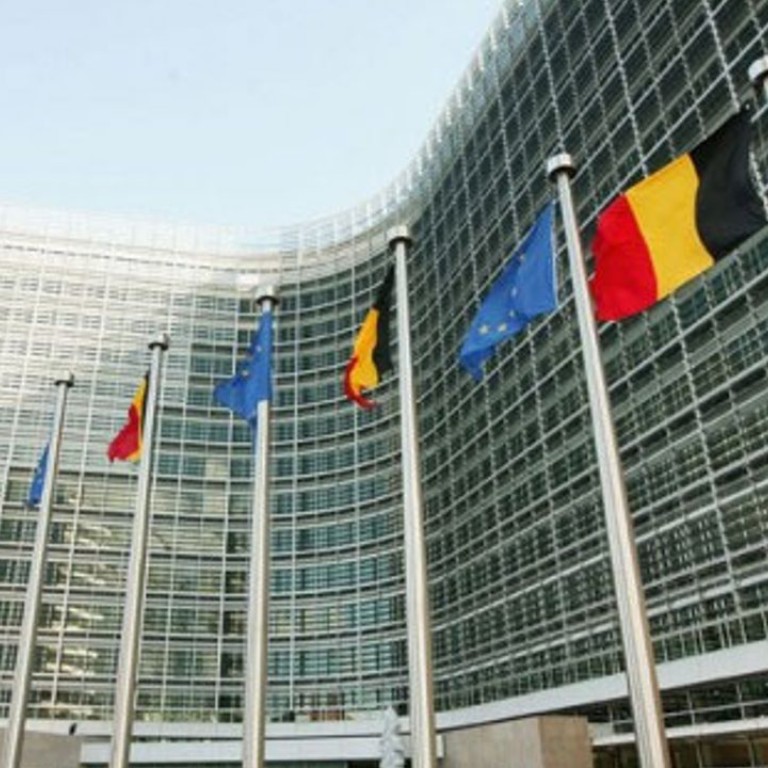
China ‘speeding up’ EU investment pact talks to help counter influence of US-led trade initiatives, say observers
China’s government has accelerated negotiations over an investment agreement with the European Union to counter the influence of US-led trade and investment treaties, observers said, adding that it was ready to make compromises in the hope of reaching a final pact next year.
China and the EU began talks on the agreement in January last year, two months after Beijing unveiled an ambitious reform plan to revamp its economy which included a pledge to further open up its markets to foreign investors.
READ MORE: European businesses say China must better protect trade secrets
“We had the impression that after the summer China felt more urgency to speed up the negotiations and has adopted a more flexible approach,” said Michael Clauss, Germany’s Ambassador to China.
China’s mission to the EU announced on Saturday that the investment agreement talks had achieved “significant progress” and the two sides would start substantive negotiations next month.
The issues may cover investment protection, state-owned enterprises, small and medium-sized firms as well as China’s status as market economy, said Wang Yiwei, director at the Centre for European Studies at Renmin University in Beijing.
He added that the talks may be accelerated once a basic framework was settled.
The pressure on China comes from the US-led Trans-Pacific Partnership agreement, signed by 12 countries in October, plus the ongoing talks between the US and EU on the Transatlantic Trade and Investment Partnership, or TIPP.
Both regions need a boost of good news in economics in 2016, and the investment agreement could provide that
China has already applied to join the European Bank for Reconstruction and Development as it forges closer economic ties with Europe. The development bank has also expressed its willingness to cooperate with the China-led Asian Infrastructure Investment Bank, or AIIB.
Both sides want to push ahead with the investment talks, which are held every couple of weeks either in Beijing or Brussels, economists said.
The negotiations involve concessions and compromises on both sides, but there is a strong possibility of reaching a deal next year, they said.
“The EU is facing a lot of problems and the progress of TIPP failed to match its expectations,” said Wang at Renmin University.
China may offer more market access and be more open in talks about the status of state-owned firms, while the EU could reduce investment protection, according to Wang.

Joerg Wuttke, the president of the EU Chamber of Commerce in China, said: “The investment treaty is like a WTO [World Trade Organisation] for us, a rare opportunity for EU companies to negotiate for more market access in times where Chinese companies seek a strong investment agreement in the EU.
READ MORE: China applies to join European development bank as it bids to increase global financial clout
“EU business strongly believes that a conclusion in late 2016 is possible and necessary. Both regions need a boost of good news in economics in 2016, and the investment agreement could provide that in symbol and substance,” he said.
China has already signed investment treaties separately with most EU members, but a comprehensive China-EU investment pact would pave the way for a feasibility study for a free trade agreement between the two sides.
“As Chancellor Merkel made clear during her visit to China, the EU will stick to its decision not to start free trade agreement negotiations in parallel to the ongoing investment talks,” said Ambassador Clauss.
READ MORE: When it comes to ties with China, European pragmatism trumps the US
Another issue to be resolved is the status of China’s economy under WTO rules.
China thinks it will be automatically granted the status of a market economy in December next year under the terms of the agreement when it entered the world trade body.
But EU member states are deeply split on whether to grant China market economy status, with France and Italy the biggest opponents.
They fear it will make it harder for them to impose higher anti-dumping duties on China’s imports to the EU, which may harm their economies and risk job losses.

